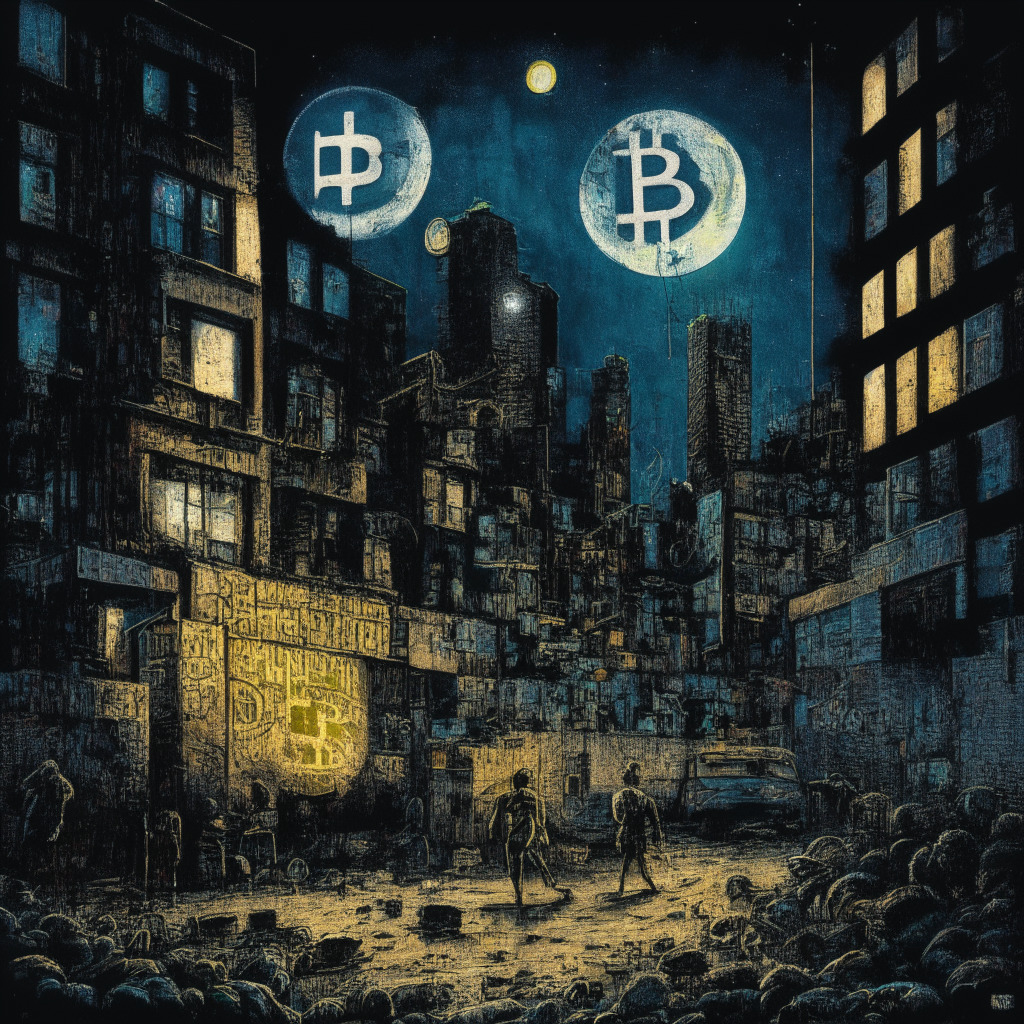FC Barcelona collaborates with NFT collection World of Women to launch the “Empowerment” NFT, inspired by soccer player Alexia Putellas. This partnership highlights the growing adoption of blockchain technology in sports and addresses concerns about environmental impact and representation.
Search Results for: Celo
FC Barcelona & World of Women NFT: Empowering Women or Just Hype?
FC Barcelona collaborates with NFT project World of Women for the second release of their “Masterpieces” collection, featuring digital artwork “Empowerment” honoring women’s club captain Alexia Putellas. The partnership aims to grow female representation in sports and celebrate inspirational figures, merging sports, art, and blockchain technology.
Tottenham Hotspur Embraces Blockchain with Exclusive Fan Token on Chiliz Platform
Tottenham Hotspur introduces its fan-exclusive token, $SPURS, on the Chiliz Blockchain to improve fan engagement. The token promises to offer fans participation in team-related decisions and other exclusive club activities. Despite potential regulatory concerns, this innovation promises rewarding experiences and marks a new chapter in fan engagement.
Tottenham Hotspur Embraces Blockchain: Balancing Fan Monetization and Complex Regulations
Tottenham Hotspur embraces blockchain technology, partnering with the Chiliz blockchain to launch a Web3 fan token unlocking unique privileges. However, the absence of comprehensive blockchain token regulation presents potential challenges for fans and sport entities navigating this technology.
Bitcoin & Street Art: An Unconventional Crusade Against Traditional Finance Systems
Barcelona-based Street Cy₿er collective, comprising artists, activists, and bitcoin enthusiasts, is spreading Bitcoin-inspired graffiti across major European cities. By challenging the status quo and advocating for a decentralised financial future, they use art to invite a dialogue around Bitcoin and its potential global impact. Their creations range from calls for Bitcoin-funded education to predictions of a future of peace due to Bitcoin’s scarcity and transparency.
Navigating Climate Change: The Intersection of Blockchain and Environmental Responsibility
“The Web3 ecosystem is progressively altering the blockchain narrative through the Ethereum Merge, which transitions from energy-intensive proof-of-work consensus to a greener, environmentally friendly proof-of-stake system. This change attracts eco-conscious activists, triggers innovation in regenerative finance, and encourages blockchain-based projects to offset their carbon footprint.”
Opera Mini Harnesses the Power of Blockchain with MiniPay: Reshaping Africa’s Mobile Payment Landscape
Opera Mini has announced a partnership with Celo Blockchain to launch a non-custodial wallet, named MiniPay, integrated into its mobile browser. With the ability to perform transactions using only a phone number and support for local payment methods, MiniPay is designed to transform mobile payments particularly in Africa.
Navigating the Future: Exploring Recent Advances and Challenges in Blockchain and Crypto Industry
“BNB Chain developers launched opBNB’s mainnet, aiming to address blockchain’s congestion and high transaction costs. Nansen presented an AI-powered upgrade of its platform to track suspicious trades and monitor transfers. Ripple plans to hire internationally due to regulatory dissatisfaction. Telegram and TON Foundation announced a self-custodial crypto wallet, TON Space, while Opera launched a non-custodial stablecoin wallet in Africa.”
Opera’s New Step into Blockchain: Introducing MiniPay Stablecoin Wallet in Africa
Opera plans to launch a non-custodial stablecoin wallet, MiniPay, in Africa. This wallet, built on the Celo blockchain, allows users to send or receive stablecoins using their mobile numbers. However, concerns about high fees and unreliable service remain. MiniPay will only support Celo Dollar, aimed to prevent user confusion with multiple currencies. Despite the recent downturn in fintech, the blockchain sector maintains resilience in Europe.
Ronaldinho’s Crypto Controversy: Is Football in a Blockchain Dilemma?
Brazilian football legend Ronaldinho faces scrutiny from lawmakers for his potential involvement in cryptocurrency pyramid schemes linked to platforms 18kRonaldinho and LBLV. Accused of misleadingly baiting potential investors, Ronaldinho could face incarceration if he defies a hearing order. A collective loss claimed by investors totals around $61 million. The outcome of the case could impact future athletes’ crypto investments.
Crypto Symphony: Week’s Highs and Lows from The World of Cryptocurrency
“This week, Bitcoin surged significantly and MicroStrategy plans to further boost its BTC coffers. Meanwhile, Tether marked a successful quarter, generating profits over $1 billion. Surprisingly, ETH 2,879 was rescued from a formidable hack thanks to an ethical hacker and Justin Sun. Volatility continues in the cryptocurrency market.”
Surge in XDC Network’s Value: An Apt Investment or Overbought Anomaly?
“Enterprise-focused blockchain, XDC Network experienced an exciting +100% price surge recently. Despite a slight 24-hour decrease and hints of overbuying, its upside potential remains strong. Meanwhile, new digital token Shibie, a fusion of pop-culture elements, appears set to redefine the meme coin space, boasting ambitious plans and a broadening reach, despite market risks.”
Brian Brooks Joins Hashdex: A Coup or a Concern for the Crypto Community?
“Brian Brooks, former Comptroller of the Currency under the U.S. government and CEO of Binance.US, joins Hashdex board of directors. His vast experience in financial regulation and crypto industry attracted Hashdex CEO Marcelo Sampaio. Brooks predicts crypto assets will revolutionize global industries.”
Navigating Crypto Terrain: From BNB Shorting to 1inch Rally and Bitcoin Halving Implications
“BNB perpetual futures signal a price drop with increased shorting, as 1INCH value surges by over 58%. Bitcoin’s upcoming halving event in 2024 is predicted to challenge miner revenues. Meanwhile, CELO’s growth aligns with cLabs’ transition proposal, showcasing the crypto sphere’s dynamism and unpredictability.”
Eyeball Scanning for Cryptocurrency: An Insight into Worldcoin’s Innovative Yet Controversial Venture
Worldcoin’s project World ID, a “global digital passport,” is gaining popularity, with 2 million sign-ups achieved in record time. This system rewards users with cryptocurrency for uploading their iris data. Despite potential privacy concerns, other protocols like Okta’s Auth0 and Talent Protocol have integrated World ID into their processes, endorsing the project’s credibility.
Spain Leads Europe in Embracing Worldcoin: Exciting Progress or Troubling Privacy Concerns?
“Worldcoin, Sam Altman’s brainchild, has earmarked Spain as its principal operational domain, propelled by growing interest in its privacy-conserving World ID program. The World ID, a personhood proof that emphasizes human essence online, has already onboarded over 150,000 Spaniards and attracts 20,000 more each month. The company aims to foster sustainable digitization while preserving privacy and data security.”
Swiss Football and Credit Suisse: A New Game in NFTs and Women’s Football Promotion
Credit Suisse in collaboration with Swiss Football Association (SFA) releases a non-fungible token (NFT) collection featuring the Swiss Women’s National Team, aiming to support and promote women’s football. The 756 NFTs are not just digital but offer additional rewards such as meeting players and signed jerseys.
Week in Review: FTX Splash, Binance Moves & Global Crypto Legal Twists
“This week in crypto was marked by major exchange operations, regulatory challenges, and shifts in nations’ attitudes towards digital assets. Developments included FTX’s plans to reopen, Binance’s regulatory issues, MicroStrategy’s portfolio growth, potential CBDC launches, and varied legal positions on crypto worldwide. These events highlight the rapidly evolving crypto landscape.”
EDX Markets Launch: The Pros, Cons, and Main Conflicts in the Crypto Sphere
EDX Markets, a new crypto exchange backed by Citadel Securities, Fidelity Investments, and Charles Schwab, offers trading for major cryptocurrencies without storing the digital assets themselves. Meanwhile, regulatory concerns and security risks emphasize the importance of vigilance and due diligence in the crypto space.
Tether’s Chinese Securities Exposure: Unveiling the Mystery and Its Market Impact
Newly disclosed documents reveal that Tether Holdings Ltd., issuer of the largest stablecoin USDT, previously held reserves in Chinese company-issued securities, short-term loans to Chinese companies, and a loan to crypto platform Celsius Network. Concerns arise over Tether’s $5.1 billion lending program, underpinning USDT’s importance for liquidity and stability in cryptocurrency markets.
Regulation Debate: SEC’s Approach Limits Crypto Exchange Accessibility & Impedes Token Functionality
The House Financial Services Committee discussed regulation of digital asset markets, focusing on crypto market structure and stablecoin regulation. Aaron Kaplan, CEO of Prometheum, stated that existing securities laws suffice for crypto regulation, echoing SEC Chair Gary Gensler’s viewpoint. However, some argue that the SEC’s current approach doesn’t provide a clear path for crypto exchanges.
Crypto Meets Formula 1: Mysten Labs’ Impact on Racing and Fan Engagement
Web3 infrastructure firm Mysten Labs partners with Red Bull Racing, introducing blockchain technology into Formula 1. This collaboration enables fan engagement through staked tokens and showcases the growing influence of crypto and Web3 in the sports industry.
Deutsche Telekom Dives into Blockchain as Polygon Validator: Boon or Bane?
Deutsche Telekom has entered the blockchain space as a validator on Ethereum scaling solution, Polygon, providing staking services and enhancing the potential of blockchain technology. This move reflects their growing interest in the industry, attracting large-scale investors and driving innovation in decentralized finance.
Crypto Market’s Rollercoaster Ride: Analyzing Winners and Losers in Recent Fluctuations
The crypto market experienced interesting fluctuations over the past week with individual coins’ values shifting. While some digital assets thrived, others faced stability challenges, emphasizing the importance of monitoring the crypto space for trends and understanding each coin’s underlying fundamentals.
MetaMask and PayPal Join Forces: Revolutionizing Crypto Accessibility in the US and Beyond
The collaboration between MetaMask and PayPal enables American users to buy ETH and transfer it between the platforms, making cryptocurrency more accessible. This partnership expands PayPal’s crypto assets and introduces the “Buy Crypto” feature within MetaMask, reflecting an exciting future for blockchain technology and crypto markets.
Crypto Lender Voyager’s Self-Liquidation: Risks, Recovery Rates, and Regulatory Pressures
Bankrupt crypto lender Voyager Digital announces self-liquidation after failed acquisition deals with FTX and Binance.US. Customers now face a recovery rate of only 36% of their crypto holdings, significantly lower than initially expected. Liquidation of select digital assets will affect major cryptocurrencies like Algorand, Celo, and Avalanche.
Voyager Digital’s Asset Recovery: Liquidation vs Digital Reimbursement Debate
Crypto broker Voyager Digital focuses on returning assets to customers after failed deals with FTX US and Binance US. It plans to liquidate certain digital assets, while returning major cryptocurrencies at a 36% recovery rate. The uncertain regulatory climate and previous exposure to a failed crypto hedge fund contribute to the challenges faced by Voyager and the crypto industry.
Google Cloud Boosts Web3 Startups: A Step Forward to Blockchain Domination or Mere Hype?
Google Cloud recently announced its intention to support Web3 startups and projects in building and […]



























